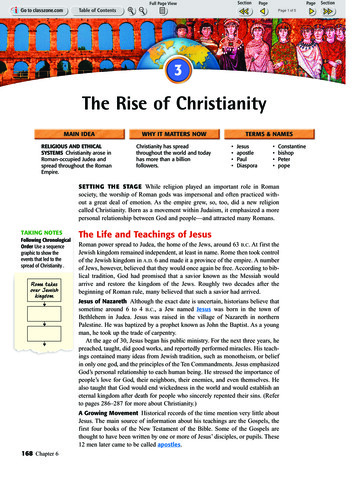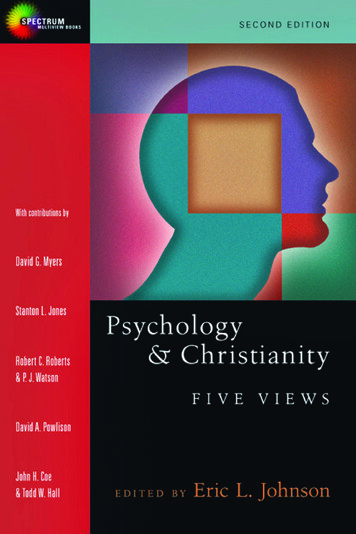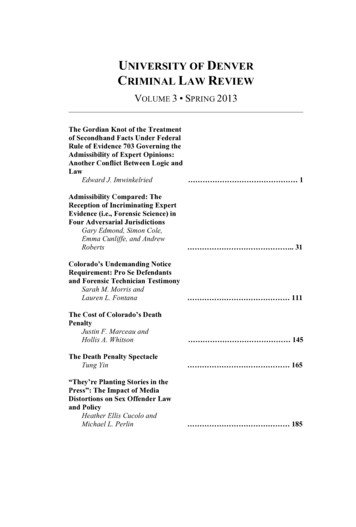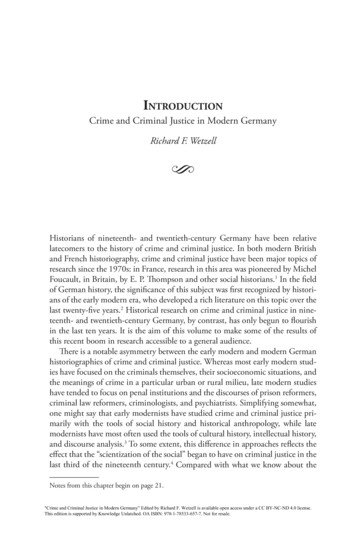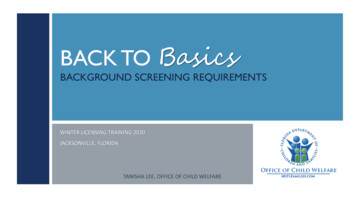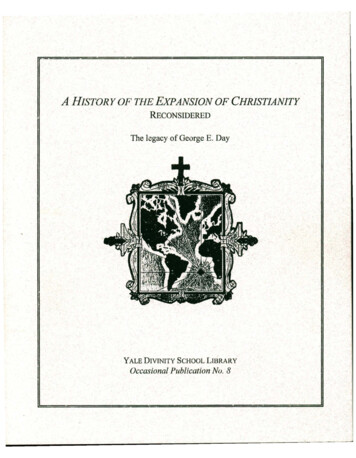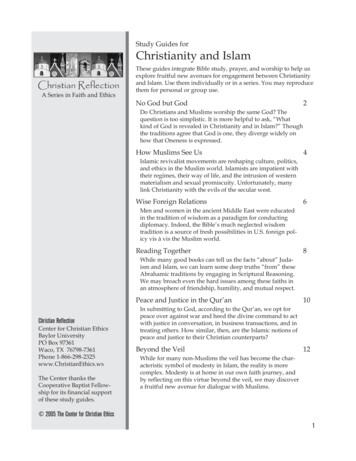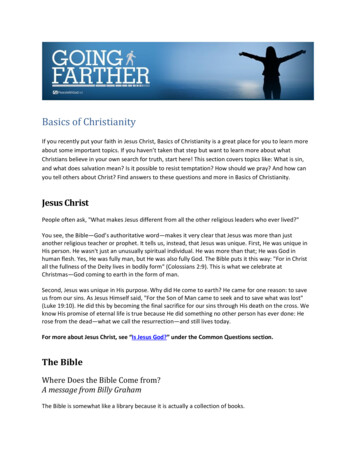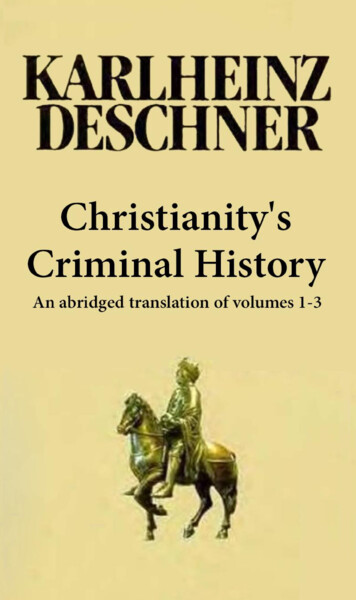
Transcription
A DRAFTBefore final proofreading - September 10th 2018October 3, ly-3/"Finally, the abridged translation ofKarlheinz Deschner’s book on thehistory of Christianity is available inprinted form -criminal-history/paperback/product23821307.html
All ten volumes in hteDesChristentums 201808
Draft before final proof reading10 September 201888, 304 words footnotes250 pagesCHRISTIANITY’S CRIMINAL HISTORYVol. IKarlheinz Deschner
Daybreak Publications, 2018Soft cover ISBN:?2
(This free translation is dedicated to my German friend, Albus)3
4
CONTENTSEditor’s prefaceINTRODUCTIONThe Early Period: from Old Testament origins to the death of SaintAugustineThe following chapters appear in Deschner’s second and thirdvolumes of the original German edition:FORGERIESIN THEOLD TESTAMENTThe bibles and some peculiarities of the Christian BibleThe five books of Moses, which Moses did not writeOther forgeries in the Old TestamentThe Jewish apocalypticPortrayals of the biblical female worldOpposition to the Old TestamentForgeries in diaspora JudaismFORGERIESIN THENEW TESTAMENTThe error of JesusThe ‘Holy Scriptures’ are piled upGod as the author?Christians forged more consciously than JewsNeither the Gospel of Matthew, nor the Gospel of John, norJohn’s Book of Revelation come from the apostles to whomthe Church attributes themSix forged ‘epistles of Paul’The Pastoral EpistlesThe Second Epistle to the Thessalonians5
Colossians, Ephesians and The Epistle to the HebrewsAll the ‘general epistles’ are forgeriesPeter, John and other apostlesInterpolations in the New TestamentNeither Jesus instituted the papacy nor Peter was bishop ofRomeThere is no evidence of Peter’s stay and death in RomeThe story of the discovery of Peter’s tombThe list of fabricated Roman bishopsMost of the following chapters are taken from Deschner’s firstvolume of the original German edition:BACKGROUNDIN THEOLD TESTAMENTMoses and the Book of JudgesThe ravages of David and the modern translatorsThe sacred warmongering of the MaccabeesThe Jewish War (66-70)Bar Kokhba and the ‘Last War of God’ (131-136)The Jewish religion, tolerated by the pagan stateEARLY CHRISTIANITYInterpretatio ChristianaFirst ‘heretics’ in the New TestamentThirteen saints and notable ChristiansSaint Jerome and OrigenTHE PERSECUTIONOF THECHRISTIANSAnti-Hellene hatred in the New TestamentThe defamation of the Greco-Roman religionThe persecution of the ChristiansMost of the written statements about the martyrs are false,but all of them were considered as totally valid historicaldocumentsThe Roman emperors viewed retrospectivelyCelsus and Porphyry6
SAINT CONSTANTINE: THE FIRST CHRISTIAN EMPERORWar against MaxentiusWar against MaximinusWar against LiciniusThe Catholic clergy, increasingly favouredConstantine as saviour, deliverer, and vicar of GodNo more a pacifist ChurchChristian family life and savage criminal practicesConstantine against Jews and ‘heretics’Constantine against the Greco-Roman culturePersia, Armenia and ChristianityCONSTANTINE’SSUCCESSORSThe first Christian dynasty founded on family exterminationFirst wars among devout ChristiansConstantius and his Christian-style governmentA father of the Church who preaches looting and killingFirst assaults on the templesJULIANHecatombs under the pious GallusEmperor JulianChristian tall storiesAFTER JULIANRivers of blood under the Catholic ValentinianTrembling and gnashing of teeth under the Arian ValensATHANASIUS, DOCTOROF THECHURCHThe complicated nature of GodIt was not fought for faith but for powerThe Council of NicaeaCharacter and tactics of a Father of the ChurchThe death of AriusThe ‘battlefield’ of AlexandriaAntioch and ConstantinopleShelter with a twenty-year-old beauty7
AMBROSE,DOCTOR OF THECHURCHNon-white Ambrose drives the annihilation of the GothsEmperor Theodosius ‘the Great’Against the Greco-Roman religionTHE FATHER OF THE CHURCH AUGUSTINE‘Genius in all fields of Christian doctrine’Augustine’s campaign against the DonatistsThe overthrow of PelagiusAugustine attacks Greco-Roman cultureAugustine sanctions the ‘holy war’8
EDITOR’SPREFACEChristianity is the greatest regression humanity hasever experienced: The Jew has thrown back humanity oneand a half thousand years.—Hitler’s Table TalkThe present book is an abridged translation of somechapters of the first three volumes of Karlheinz Deschner’s tenvolume Kriminalgeschichte des Christentums (criminal history ofChristianity). The original volumes in German and also in theSpanish translation that I have been using contain thousands ofendnotes, omitted here. This preliminary translation is only the firststep for a more formal translation of Deschner’s magnum opus.I have modified some headings, added several illustrations,omitted ellipsis between unquoted paragraphs and even dared tosimplify a few phrases. I also replaced many instances of the author’suse of the word ‘pagan’ with terms like ‘Hellenes’,‘advocates of Greco-Roman culture’ or simply added quotations onthe word ‘pagan’.Those familiar with the masthead of my website The West’sDarkest Hour, the article ‘Rome vs. Judea; Judea vs. Rome’, knowthat the takeover of the Classical World was mainly a takeover bynon-Aryans.1 It cannot be more significant, as Deschner mentions,that before the introduction of the pejorative term ‘pagan’ the nonChristians of the Roman Empire were called héllenes and éthne bythe treatise writers of the 4th century. The expression hellénonéthne can be translated into modern English as ‘the Greek races’, thatis, the white peoples. Therefore, instead of the author’s textual‘pagan’ I chose the pre-derogatory term in the vernacular of the 4thIn addition to Evropa Soberana’s ‘Rome vs. Judea’ in my bookcompilation The Fair Race’s Darkest Hour (2018), see other essays bySoberana, especially those about the ethnic group of ancient Greek andRomans.19
century, ‘Hellenes’, right before the status of the white peoples wasdemoted unless they started to worship a Semitic god.White nationalists are pretty knowledgeable of the Jewishproblem. But very few are aware that Jewish subversion is theproduct of a religion of Semitic origin: Christianity. Who amongthe white nationalists knows the real history of Christianity? Whois aware that Christian fanatics literally destroyed the GrecoRoman world? As Catherine Nixey put it in The Darkening Age: TheChristian Destruction of the Classical World, a book publishedrecently:In a spasm of destruction never seen before—and onethat appalled many non-Christians watching it—during thefourth and fifth centuries, the Christian Church demolished,vandalized and melted down a simply staggering quantity ofart. Classical statues were knocked from their plinths, defaced,defiled and torn limb from limb. Temples were razed to theirfoundations and burned to the ground. A temple widelyconsidered to be the most magnificent in the entire empire waslevelled.Many of the Parthenon sculptures were attacked, faceswere mutilated, hands and limbs were hacked off and godswere decapitated. Some of the finest statues on the whole buildingwere almost certainly smashed off then ground into rubble thatwas then used to build churches.Books—which were often stored in temples—sufferedterribly. The remains of the greatest library in the ancientworld, a library that had once held perhaps 700,000 volumes,were destroyed in this way by Christians. It was over amillennium before any other library would even come close toits holdings. Works by censured philosophers were forbiddenand bonfires blazed across the empire as outlawed books wentup in flames.Virtually all westerners ignore the ISIS-like history of earlyChristianity right after Constantine handed over the Roman Empireto his bishops. They know only the martyr myths, the pious legendsand the New Testament lies they told us as children.Karlheinz Deschner (1924-2014) was a liberal German. Hespent the first sixty years of his life investigating the history of theCatholic Church before starting the ten volumes of hisKriminalgeschichte series, which only ended at ninety. It is a more10
encyclopaedic treatise about the real history of Christianity thanNixey’s book for the general public.I started reading Deschner eighteen years ago when I wasalso a liberal. I would not wake on the Jewish question until six yearsago. But Deschner, like all Germans of our times who aspire to seetheir books in the bookstores, never woke up. He even criticised themost notorious ‘anti-Semites’ in early Church history. This said, thedifference between Deschner and liberal theologians like Hans Küng(The Church) and conservative historians like Paul Johnson (AHistory of Christianity) is that Küng and Johnson concealed a greatdeal of Christianity’s criminal history. It is remarkable how a scholarwho abandoned Christianity, like Deschner, was capable to see it ina way that Küng, Johnson, and the contemporary Christian authorswould never dream of.After awakening to the realities of the Judeo-Christianproblem I realised that Deschner’s information, despite hismistaken point of view, can be rescued. It only has to be processedthrough the filter of someone who is completely awakened. HadGermany won the war, Deschner, who appears above in Naziuniform, could have written his history from the National Socialistpoint of view.César Tort Jr.September of 201811
12
CHRISTIANITY’S CRIMINAL HISTORYINTRODUCTIONTo begin, I will say what the reader should not expect. As inall of my criticisms of Christianity, here there will be missing manyof the things that also belong to history, but not to the criminal historyof Christianity that the title indicates. That, which also belongs tohistory, may be found in millions of works that fill up the libraries,archives, bookstores, academies and the lofts of the parish houses.He who wants to read those materials can do so long as he has life,patience and faith.This religion has thousands, hundreds of thousands ofapologists and defenders; it has books in which many boast of ‘theluminous march of the Church through the ages’ (Andersen), and thatthe Church is ‘one’ and ‘the living body of Christ’ and ‘holy’ because‘its essence is holiness; sanctification its end’ (the Benedictine vonRudloff). It is understood, on all this, that the unfortunate side details(religious wars, persecutions, fighting, famine) happened in thedesigns of God; often inscrutable, always just, full of wisdom andsalvific power. Given the overwhelming predominance of the silly,misleading and deceitful glorifying, was it not necessary to show theopposite view insofar as it is much better proven? At any event,those who always want to see the bright side are shielded fromthe ugly side, which is often the truest.The distinction between the Church and Christianity isrelatively recent. As is known, there is a glaring contradictionbetween the lives of the Christians and the beliefs they profess: acontradiction which has always been downplayed by pointing tothe eternal opposition between the ideal and the real. Nobody daresto condemn Christianity because it has not fulfilled all its ideals, or13
has fulfilled half of them, or not at all. But such an interpretation‘equals to carry too far the notion of the human and even the all toohuman, so that when century after century and millennium aftermillennium someone does the opposite of what he preaches thenbecomes, per share and effect of all his history, epitome and absoluteculmination of worldwide and historical criminality’ as I said duringa conference in 1969 which earned me a visit to the courthouse.Because that is really the question. Not that they have failedthe ideals in part or by degrees, no: it is that those ideals have beenliterally trampled, without which the perpetrators lay down, for amoment, their claims of self-proclaimed champions of such ideals,nor stop their self-declaration of being the highest moral authoritiesin the world.Western Christianity, in any case, ‘was essentially createdby the Catholic Church’; ‘the Church, organised from the papalhierocracy down to the smallest detail, was the main institution of themedieval order’ (Toynbee).Part of our question are the wars started or commanded bythe Church, the extermination of entire nations: the Vandals, theGoths, and the relentless slaughter of East Slav peoples—all of them,according to the chronicles of the Carolingian and the Ottos,criminals and confused peoples in the darkness of idolatry that wasnecessary to convert by any means not excepting betrayal, deceit andfury. Of the fourteen legislated capital crimes by Charlemagne aftersubduing the Saxons by blood and fire, ten offenses relate exclusivelyto the religious camp. Under the old Polish criminal law, thoseguilty of eating meat during the Easter fast were punished bypulling their teeth out.We will also discuss ecclesiastical punishments forviolations of civil rights. The ecclesiastical courts wereincreasingly hated. There are issues that we will discussextensively: sacrificial practices (the stolen goods from the Churchto be repaid fourfold, and according to Germanic law up to twentytimes); ecclesiastical and monastic prisons, especially of theergastulum type (the coffins were also called ergastula), where theywere thrown both ‘sinners’ as the rebels and madmen, and usuallyinstalled in basements without windows or doors, but wellequipped with shackles of all kinds, racks, handcuffs and chains.We will document the exile punishment and the application of it to14
the whole family in case of the murder of a cardinal; whichextended to the male descendants up to the third generation. Alsovery fashionable were torture and corporal punishment, especiallyin the East where it became furiously popular to mutilate limbs,pull out eyes and cut off noses and ears.It is quite plausible that not all authorities indulgedthemselves in such excesses, and certainly not everyone would beas insane as the Abbot Transamund, who tore off the eyes of themonks of the Tremiti Convent, or cut their tongues (and, despite this,enjoyed the protection of Pope Gregory VII, who also enjoyed greatnotoriety). Without a doubt, the churches, particularly the RomanChurch, have created significant cultural values, especially buildings,which usually obeyed no altruistic reasons (representing power), andalso in the domain of painting, responding to ideological reasons (theeternal illustrations of biblical scenes and legends of saints). Butaside from such opted love of culture that contrasts sharply ifferencecontemplated the ‘things of this world’, as they believed in theimminent end of all (a fundamental error in which Jesus himselffell)—, it should be noted that most of the cultural contributions ofthe Church were made possible by ruthlessly exploiting of themasses, the enslaved and the impoverished, century after century.And against this promotion of culture we find further culturalrepression, cultural intoxication and destruction of cultural property.The magnificent temples of worship of antiquity weredestroyed almost everywhere: irreplaceable value buildings burnedor demolished, especially in Rome itself, where the ruins of thetemples served as quarries. In the 10th century they still engaged inbreaking down statues, architraves, burning paintings, and the mostbeautiful sarcophagi served as bathtubs or feeders for pigs. But themost tremendous destruction, barely imaginable, was caused in thefield of education. Gregory I, the Great, the only doctor Pope of theChurch in addition to Leo I, according to tradition burned a largelibrary that existed on the Palatine. The flourishing book trade ofantiquity disappeared; the activity of the monasteries was purelyreceptive. Three hundred years after the death of Alcuin and RabanusMaurus, the disciples were still studying with manuals written bythem. Even St. Thomas Aquinas, the Church’s official15
philosopher, writes that ‘the desire for knowledge is a sin when itdoes not serve the knowledge of God’.In universities, the Aristotelian hypertrophy aborted anypossibility of independent research. Philosophy and literature weresubject to the dictation of theology. History, as a science, wascompletely unknown. The experimentation and inductive researchwere condemned; experimental sciences were drowned by theBible and dogma; scientists were thrown into the dungeons, or sentto the stake. In 1163, Pope Alexander III (remember in passing thatat that time there were four anti-popes) forbade all clerics studyingphysics. In 1380 a decision of the French parliament forbade thestudy of chemistry, referring to a decree of Pope John XXII. Andwhile in the Arab world (obedient to Muhammad’s slogan ‘The inkof scholars is more sacred than the blood of martyrs’) the sciencesflourished, especially medicine, in the Catholic world the bases ofscientific knowledge remained unchanged for more than amillennium, well into the 16th century. The sick were supposed toseek comfort in prayer instead of medical attention. The Churchforbade the dissection of corpses, and sometimes even rejected theuse of natural medicines for considering it unlawful intervention withthe divine. In the Middle Ages, not even the abbeys had doctors, noteven the largest. In 1564 the Inquisition condemned to death thephysician Andreas Vesalius, the founder of modern anatomy, foropening a corpse and for saying that man is not short of a rib thatwas created for Eve.Consistent with the guidance of teaching, we find anotherinstitution, ecclesiastical censure, very often (at least since the timeof St. Paul in Ephesus) dedicated to the burning of the books ofpagans, Jews or Saracens, and the destruction (or prohibition) of rivalChristian literature, from the books of the Arians and Nestoriansuntil those of Luther. But let us not forget that Protestantssometimes also introduced censorship, even for funeral sermons andalso for non-theological works, provided they touched onecclesiastical matters or religious customs.The above is a selection of the main issues that I refer to inmy history of the crimes. And yet, it is only a tiny segment of theoverall history.History!Like any other historian, I only contemplate a history of thecountless possible histories, a particular one, worse or better16
defined, and even this biased aspect cannot be considered thewhole ‘complex of action’: an absurd idea, given the volume ofexisting data; theoretically conceivable, but practically impossibleand not even desirable. The author who intends to write a criminalhistory of Christianity is constrained to mention only the negativeside of that religion which weight has exceeded ultimately that of theperceived or real positives. Those who prefer to read about the otheraspects ought to read other books: The Joyful Faith, The Gospel asInspiration, Is it True that Catholics are No Better Than the Others?,Why I Love My Church?, The Mystical Body of Christ, Beauties ofthe Catholic Church, Under the Cloak of the Catholic Church, GodExists (I Have Known Him), The Way of Joy Toward God, The GoodDeath of a Catholic, With the Rosary to Heaven, SOS from thePurgatory, The Heroism of Christian Marriage.The pro-Christian literature! More numerous than the sandsof the sea: against 10,000 titles just one of the style of this CriminalHistory of Christianity, not to mention the millions of issues if weadd the countless religious periodicals.It turns out that truly there are among Christians men ofgood will, as in all religions and in every game, which should notbe taken as data in favour of those religions and parties, because ifthat were allowed how many crooks would testify against suchbelief? And good Christians are the most dangerous, because theytend to get confused with Christianity, or to borrow the words ofLichtenberg, ‘unquestionably there are many righteous Christians,only that it is no less true that in corpore their works as such havenever have helped much’.What is the basis of my work? As with most historicalstudies, it is based on sources, tradition, contemporaryhistoriography; especially texts. But when I expose my subjectivitybluntly, my ‘point of view’ and my ‘positioning’, I think I show myrespect to the reader better than the mendacious scribes who wantto link their belief in miracles and prophecies; intransubstantiations and resurrections from the dead; in heavens,hells and other wonders with the pretence of objectivity, accuracyand scientific rigor. Could it not be that, with my confessed bias, Iam less biased than them? Could it be that my experience, mytraining, did not authorise me to form a more independent opinionabout Christianity? At the end of the day I left Christianity, despite17
having been formed in a deeply religious household, as soon as itceased to seem real.Let’s face it: we are all ‘partial’, and he who pretendsdenying it is lying. It is not our bias what matters, but confessing it,without the pretence of impossible ‘objectivities’. We are allbiased. This is particularly true in the case of historians who are morebent on denying it, because they are the ones who lie the most—andthen they throw to one another the dogs of Christianity. Howridiculous, when we read that Catholics accused theProtestants of ‘bias’; or the Protestants accusing the Catholics,when thousands of theologians of various confessions throw overeach other so common reproach; for example, when the JesuitBacht wants to see in the Protestant Friedrich Loofs ‘an excess ofzeal against monastic status as such’, for which ‘his views are tooone-sided’. And how would not the Jesuit Bacht opine with partialitywhen he refers to a reformed; he, who belongs to an order whosemembers are required to believe that white is black and blackwhite, if mandated by the Church? Like Bacht, unquestioningobedience is imposed upon all Catholic theologians in the habitthrough baptism, dogma, the chair, the ecclesiastical license to printand many other obligations and restrictions. And so they live yearafter year, enjoying a steady income in exchange for advocating aparticular view, a particular doctrine, a particular interpretation ofhistory strongly impregnated with theology not so much to deceivethemselves but to continue cultivating the deception of others. Forexample, by accusing of bias the opponents of their confession andpretending to believe that Catholics are safe from such defect; as ifit didn’t exist, for two thousand years, another bias sneakier thanthe Catholic.Historiography is no more than the projection into the pastof the interests of the present. The conservative historian whocompared his job to that of the priest (for heaven’s sake!) andissued for himself reports of maximum impartiality and objectivity,claimed that he ‘erased his subjectivity’! This unshakable faith forobjectivism, called ‘ocularism’ by Count Paul York Wartenburgand lampooned as a proposal for a ‘eunuch objectivity’ by Droysen(‘only the unconscious can be objective’), is illusory. Because thereis no objective truth in historiography, nor history as it happened.‘There can only be interpretations of history, and none is definitive’(Popper). All historiography is written against the background of18
our personal vision of the world. It is true that many scholars lacksuch a worldview and thus are often considered, if not markedlyprogressive, at least notably impartial, honest and truthful. Thoseare the champions of ‘pure science’, the representatives of analleged stance of neutrality or indifference as to value statements.They reject any reference to a particular point of view, anysubjectivity, as if they were unscientific sins or blasphemies againstthe postulate of the true objectivity they advocate; against that sineira et studio [without anger and affection] which they have assacrosanct and that, as Heinrich von Treitschke ironizes, ‘nobodyrespects, let alone the speaker himself’.The fiction of the concealment of the ideological premisesof the historical presentation can serve to conceal many things: anethical relativism and a cowardly escapism fleeing categoricaldecisions on principles—which still is a decision: irresponsibilityon behalf of scientific responsibility! For a science that does notmake assessments, whether they like it or not, is an ally of thestatus quo: it supports the dominating and hurts the dominated. Itsobjectivity is only apparent, and in practice it means nothing but loveto one’s own tranquillity, security and attachment to a career. Our lifedoes not run value-free, but full of it; and scientists, insofar as theystart from life, if they claim they are value-free incur in hypocrisy. Ihave had in my hands works of historians who were dedicated to thewife who had died in the bombings, or perhaps dedicated to two orthree fallen sons on the fronts; and yet, sometimes, these peoplewant to keep their writing as ‘pure science’, as if nothing hadhappened.That’s their problem. I think otherwise. Even if it existed, andI say it does not, a totally apolitical historical research, obliviousto all kinds of judgments, such an investigation would serve nopurpose but to undermine ethics and make way for inhumanity.Moreover, it would not be true ‘research’ because it would not bededicated to revealing the relationships between the factors; as muchas it would be mere preparatory work, the mere accumulation ofmaterials, as noted by Friedrich Meinecke.Now, to what extent does the reality of history coincideswith my statement? I prefer life on principle to science, especiallywhen it starts to become apparent as a threat to life in the broadestsense. It is often objected that ‘science’ is not to blame, but only someof the scientists (the problem is that there are many, at worst19
almost all): quite a similar argument that says that we should nottake Christianity to task for the sins of Christendom. All this does notmean that I am a supporter of pure subjectivism, which does notexist. A limited capacity of conviction would have my thesis of thecriminal character of Christianity if, to prove it, I confined myself toonly some examples. But, being a multi-volume work, no one willsay that these are isolated or inconclusive examples. Because I write‘out of hostility’ the story of those I describe has made me theirenemy. And I would not consider myself refuted by having omittedwhat was also true, but only when someone proves that something Ihave written is false.There are even those who believe that it is very wrong tocriticise, especially when they are criticised, although the latterthey would never confess. Quite the contrary, they always claim theyhave nothing against criticism: that all critiques are welcome but, yes,provided they are positive critiques, constructive; not negative ordeleterious. With swollen anger they set those high standards,precisely against the ‘mania of judging’ (Aitmeyer), and display theirscandal with ‘scientific’ trims when an author dares to‘value’; when ‘the historian, given his inability as a moralist, assumesthe role of prosecutor’. Is it not grotesque that the swornrepresentatives of an ancient mystery cult, those who believe intrinities, angels, demons, hell, virgin births, celestial assumptionsof a real body, conversion of water into wine and wine into blood,want to impress us with their ‘science’? And could it not be the heightof grotesqueness that such people continue to receive the honours ofthe scientific world itself?We are invited to take care on behalf of the ‘zeitgeist’ sothat we understand and forgive. But precisely Goethe satirised it inhis Faust: ‘What you call the spirit of the times, is ultimately thespirit of the masters’. If we are not worth the testimony of the poetfor being notoriously anti-Christian and not less anticlerical, let us goto St. Augustine: ‘Times are hard, miserable times, people say. Letus live well, and times are good. Because we ourselves are the timesthat run; so that how we are, so will our time be’. In his othersermons, Augustine reiterated this idea that there is no reason toaccuse the times or the ‘zeitgeist’, but the very humans that (as thehistorians of today) blame everything on the times: those miserable,difficult and murky times. Because ‘time does not offend anyone.The offended are men, and other men are the ones who inflict the20
offenses. Oh, pain! It offends men who are robbed, oppressed, andby whom? Not by lions, snakes or scorpions but by men. And so menlive the offenses on pain, but will not themselves do the same, if theycan, and as much as they have censored it?’ Augustine knew what hemeant, as he himself fits perfectly in the last sentence of thequotation (see the last chapter of this volume). As this,ultimately, cannot be denied by the apologists, they object thatsometimes—i.e., every time it was necessary, whatever thehistorical period under consideration—the agents ‘were not trueChristians’.But look, when there were true Christians? Were they thebloodthirsty Merovingians, the Franks so fond of plunderingexpeditions, the despotic women of the Lateran period? WasChristian the great offensive of the Crusades? Was it the burning ofwitches and heretics? The Thirty Years War? The First World War,the Second or the war of Vietnam? If all those were not Christians,then who was it? In any case, the spirit of the times was not everthe same at each particular time. While Christians were spreadingtheir gospels, their beliefs and dogmas; while they weretransmitting their infection to always larger territories, there were nota few men, such as the first great debunkers of Christianity in the2nd century, Celsus; and Porphyry in the third, who knew how toraise a comprehensive and overwhelming criticism, which we stillfeel justified.
History of Christianity) is that Küng and Johnson concealed a great deal of Christianity’s criminal history. It is remarkable how a scholar who abandoned Christianity, like Deschner, was capable to see it in a way that Küng, Johnson, and
